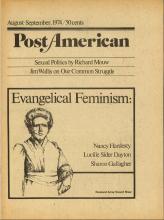Race, class, and sex were three ways Jewish men had of defining people as “other.” In The Second Sex Simone de Beauvoir says, “We find in consciousness itself a fundamental hostility toward every other consciousness; the Subject can be posed only in being opposed--he sets himself up as the essential, as opposed to the other; the inessential, the Object.” To define someone as “other” is a way of saying, “If I have to be my brother’s keeper let me define my brother as narrowly as possible, to make it less difficult for me.” To combat this misuse of other people, God’s people are warned throughout the Old and New Testaments not to oppress the poor, the stranger, the widow (woman alone).
There is a case in the Old Testament where a person who on all counts was an “other”--a female, Gentile, slave--was treated badly by Abraham and Sarah. After her body had been used she was sent away to die in the desert. But she cried out to God, and God heard her and promised her the founding of her own nation: the Arabs. The conflict generated by her abuse is apparent in the world today.
Abolition and Suffrage
The subconscious understanding of their own oppressed status may have given early women abolitionists a natural predisposition to understanding the unfairness of slavery. These women also understood that the issue wasn’t just the "vote," but any denial of personhood that resulted in the limitation of any individual’s life options.
Read the Full Article

